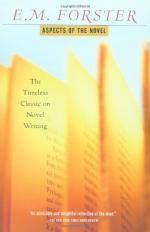|
This section contains 1,113 words (approx. 3 pages at 400 words per page) |

|
Section 5 Summary and Analysis
"The Plot" In this lecture, Forster begins by suggesting the Greek philosopher Aristotle, who maintained that "all human happiness and misery takes the form of action," is wrong. Aristotle, Forster says, knew nothing about novels and based his theory on the nature and function of drama, in which everything unseen, unknown and unknowable about human beings must be understood from action. The novelist, Forster writes, has access to the unknowable, and can therefore devote time and energy to its unexpressed, inner existence, communicating it without recourse to action. This, he suggests, is the core of the difference between story and plot. Story, he maintains, is simply a series of events narrated in time-sequence, while plot adds the element of causality, of why—and what defines the why, he says, is the unknowable. "If it is a story," he writes, "[the...
(read more from the Section 5 Summary)
|
This section contains 1,113 words (approx. 3 pages at 400 words per page) |

|




